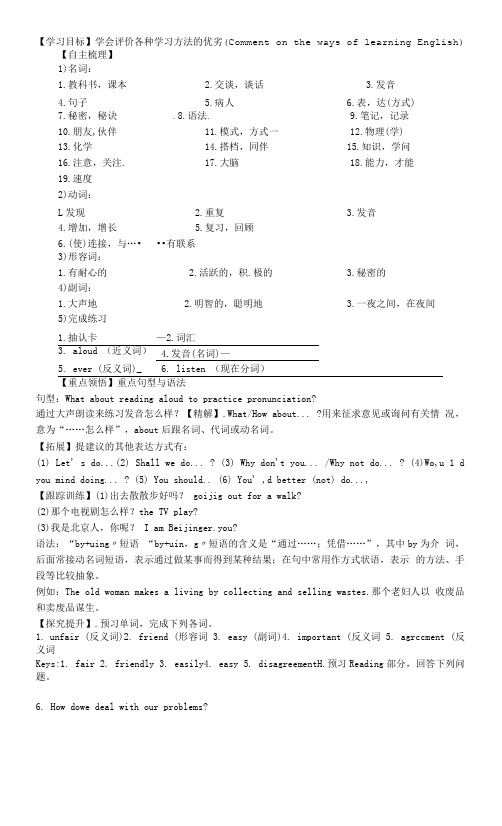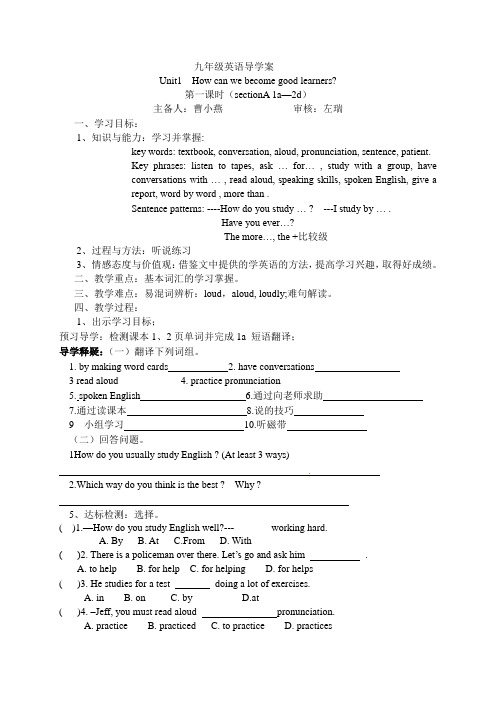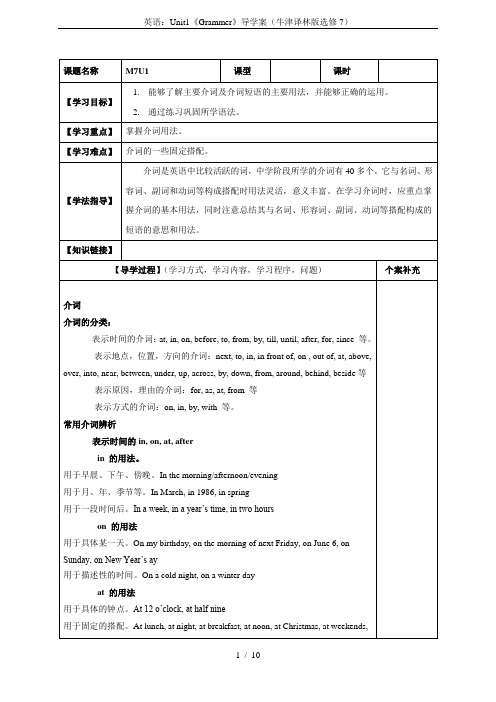UNIT 1 导学案
七年级上英语Unit1 导学案

Unit l My name’s Gina.Period One (SectionA 1a-1c)姓名班级学号【学习目标】一、知识目标:1.熟练掌握单词my, name, meet, you等。
熟读英文名字Gina, Alan, Jenny, Brown.2.学会运用Hello, Hi. Nice to meet you?等招呼用语。
3.能正确听辨运用What's your name?来询问他人的姓名4.熟练运用My name's.../ I'm....来进行自我介绍。
二、能力目标:正确运用What's your name?来询问他人姓名和运用My name's... / I'm...来介绍自己。
三、情感目标:广交好友。
四、学习重难点:1.使用形容词性物主代词my, your.2. 大量的英语人名。
【快乐自学】领悟基础知识我能行一、试一试,看英标学1a-1c的新单词(Page95的P1)。
请同学们先记忆然后完成下题 1. 我的名字 2.地图 3.你的名字4.见到你很高兴。
meet you.5.你叫什么名字?your name?6.我的名字叫Mary. Mary.或者Mary(选做)二、请大家先看看书本P1中1a的图片,然后写出你所知道的英语单词。
(看谁写的最准确最多哦)。
【自学小结】【群学学案】Step1.自学点评Step2.小组讨论1a图中的物品用英语如何表达。
Step3. 听力训练1、听录音,完成1b. 2、听录音朗读听力材料,模仿口语。
Step4. 模仿听力材料操练对话,小组內编写自己的对话,并进行操练。
Step5. 组内作品在班内展示,比一比看谁表现最好。
Step6.合作探究:1)你叫什么名字?用英语表达为?请大家思考一下:我的名字叫Alan.怎么回答?(答案不止一个哦。
)2)Nice to meet you.的答语是,除此之外的问候语还有3)总结be动词用法:【当堂训练】一、用am, is, are将下列句子填补完整。
九年级英语导学案 Unit 1 How can we become good learners

Unitl How can we become good learners ?,【学习目标】1.通过.交流和表达,进一步掌握学习英语的技巧与方法。
2.1.握下列知识点:单词.教科书,课本4.句子r ,7.秘密,秘诀重点短语:1.,通过制作单词卡片3.练习对话5.练习发音7.注意【自主梳理】预习单词,完成下列各词。
1.抽认卡 3. aloud (近义词)5. ever (反义词)7. study (过去分词)2.交谈,5.病人8.语法谈话3.发音6.表达(方式)9.笔记,记录2.4.6.2.向某人请求帮助4.爱上,喜欢上6.第一次8.犯错误词汇发音(名词)—listen (现在分词)(课本中查找答案)1.,2. 3. 4 5. 6. 7.【重点领悟】① How do you studyfor a test?语法:by+ V-ing的用法【探究提升】I.用所给单词的适当形式填空We studyby (work) with a1.It is a great way(1earn)②What about listening to tapes?3.W hat about (read) aloud n.根据汉语提示完成句子Have youever4.I study English group. a language.(practice) pronunciation and intonation?一(和朋友一起练习对话)friends?(通过制作)flashcards.6. (怎么样)listening to tapes?7.这个问题太难了,我理解不了。
It's hard m,e this question.8.朗读能提高你的口语。
-can your spoken English.Keys: 1. working 2. to learn 3.. Reading , preicticing 4. practiced witch friends5. by making 6. How about 7. too, for, to understand 8. Reading , improve.Unitl How can we become good learners ?【学习目标】学会评价各种学习方法的优劣(Comment on the ways of learning English) 【自主梳理】1)名词:1.教科书,课本2.交谈,谈话3.发音4.句子5.病人6.表,达(方式)7.秘密,秘诀.8.语法.9.笔记,记录10.朋友,伙伴11.模式,方式一12.物理(学)13.化学14.搭档,同伴15.知识,学问16.注意,关注. 17.大脑18.能力,才能19.速度2)动词:L发现 2.重复 3.发音4.增加,增长5.复习,回顾6.(使)连接,与…•••有联系3)形容词:1.有耐心的2.活跃的,积.极的3.秘密的4)副词:1.大声地2.明智的,聪明地3.一夜之间,在夜间5)完成练习1.抽认卡—2.词汇3. aloud (近义词)_4.发音(名词)—5. ever (反义词)_6. listen (现在分词)【重点领悟】重点句型与语法句型:What about reading aloud to practice pronunciation?通过大声朗读来练习发音怎么样?【精解】.What/How about... ?用来征求意见或询问有关情况,意为“……怎么样”,about后跟名词、代词或动名词。
Unit1KnowingmeknowingyouUnderstandingideas导学案-高中英语

过去分词短语作状语:
Homework
1. Sum up what we learned in class and take notes.
2.Preview the next period.
3. To develop students’reading prehension’s abilities by discussion and cooperation.
重
点
难
点
1. Master some key wordsbreath, concern, agony,phraseshelp out, let down,pull one’s weightand some expressions.
2.Now think about who you turn to for help when you face a problem.
friends
parents
teachers
online forums(网上论坛)
no one you prefer to keep things to yourself
.课
题
Unit 1 Knowing me, knowing you Understanding ideas
课
型
新授课
课
时
第二课时
学
习
目
标
1. To master basic knowledge of this lesson and use them freely.
2. Help students learn to deal with difficulties they may face in daily life.
牛津深圳版八年级英语上册《Unit 1 Encyclopaedias》导学案(1)

《Unit 1 Encyclopaedias》导学案(第1课时)【学习目标】Mastery words and expressions理解两篇摘自一本百科全书的小文章【重难点预测】重点:通过学习本章的主阅读,学会介绍人物难点:抓住信息点【自主学习】1.()v.发明()n.发明()n.发明家()n.音乐()n.音乐家( ) adj.音乐的总结:以er、or和ian结尾的单词一般表示做这项职业的人。
eg:teach v.教——teach er教师act v.表演——act or演员Italia n.意大利——Ital ian意大利人2.英汉互译(1)intelligence (2)ability(3)include (4)suddenly(5)灭绝(6)去散步3.用线将下列单词和它的中文意思连起来。
ability A.包括born F.突然human B.没有人intelligence G.发明however C.人的sudden ly H.出生nobody D.能力invention I.获胜include E.然而win J.智慧合作交流根据两篇短文的介绍在文章中找出相关的信息。
Da Vinci,Leonardo1. Year of birth2. Year of death3. Career4. Life5. Main contributionsDinosaurs1. When and where they lived2. Appearance3. Food4. Current situation理解重点词汇和句子be bornhuman beingin the countrysideas...asDa Vinci was born in the countryside.From the early age, he showed great intelligence and artistic and sc ience ability. Some dinosaurs were as small as chickens. Others were as big as ten elephants. Nobody knows why. However, we can learn about them from their fossils.五.效果反馈1.他和我一样高(as...as)2. When somebody i s born, he/she_______a. comes out of his/her mother’s bodyb. goes to see a doctorc. leaves his/her parents3. Benny’s grandparents live in th e countryside. They live ___ the city.a inside b. outside c. in the centre of4. The book includes some beautiful photos. These photos are ______ the book.a. part ofb. at the end ofc. connect ed of5. A human being i s a(n) ______.a. animalb. machinec. person6. Birds have a musical ability. They ____ sing.a. singb. cannotc. are happy to六.熟悉全文,掌握两篇短文中介绍的关键信息。
九年级英语导学案Unit 1

九年级英语导学案Unit1 How can we become good learners?第一课时(sectionA 1a—2d)主备人:曹小燕审核:左瑞一、学习目标:1、知识与能力:学习并掌握:key words: textbook, conversation, aloud, pronunciation, sentence, patient.Key phrases: listen to tap es, ask … for… , study with a group, haveconversations with … , read aloud, speaking skills, spoken English, give areport, word by word , more than .Sentence patterns: ----How do you study … ? ---I study by … .Have you ever…?The more…, the +比较级2、过程与方法:听说练习3、情感态度与价值观:借鉴文中提供的学英语的方法,提高学习兴趣,取得好成绩。
二、教学重点:基本词汇的学习掌握。
三、教学难点:易混词辨析:loud,aloud, loudly;难句解读。
四、教学过程:1、出示学习目标;预习导学:检测课本1、2页单词并完成1a 短语翻译;导学释疑:(一)翻译下列词组。
1. by making word cards2. have conversations3 read aloud ________ 4. practice pronunciation ________________5. spoken English6.通过向老师求助7.通过读课本8.说的技巧9 小组学习10.听磁带(二)回答问题。
1How do you usually study English ? (At least 3 ways)2.Which way do you think is the best ? Why ?5、达标检测:选择。
英语:Unit1《Grammer》导学案(牛津译林版选修7)

课题名称M7U1 课型课时【学习目标】1.能够了解主要介词及介词短语的主要用法,并能够正确的运用。
2.通过练习巩固所学语法。
【学习重点】掌握介词用法。
【学习难点】介词的一些固定搭配。
【学法指导】介词是英语中比较活跃的词,中学阶段所学的介词有40多个。
它与名词、形容词、副词和动词等构成搭配时用法灵活,意义丰富。
在学习介词时,应重点掌握介词的基本用法,同时注意总结其与名词、形容词、副词、动词等搭配构成的短语的意思和用法。
【知识链接】【导学过程】(学习方式,学习内容,学习程序,问题)个案补充介词介词的分类:1.表示时间的介词:at, in, on, before, to, from, by, till, until, after, for, since 等。
2.表示地点,位置,方向的介词:next, to, in, in front of, on , out of, at, above, over, into, near, between, under, up, across, by, down, from, around, behind, beside等3.表示原因,理由的介词:for, as, at, from 等4.表示方式的介词:on, in, by, with 等。
常用介词辨析1.表示时间的in, on, at, after1) in 的用法。
用于早晨、下午、傍晚。
In the morning/afternoon/evening用于月、年、季节等。
In March, in 1986, in spring用于一段时间后。
In a week, in a year’s time, in two hours2) on 的用法用于具体某一天。
On my birthday, on the morning of next Friday, on June 6, onSunday, on New Year’s ay用于描述性的时间。
大一英语Unit 1 导学案
导学案:Unit 1 Living green1.Group work: According to the three questions in page 13, work with your partners and give abrief speech. Refer to the pictures in the same page.2.Text learning:a) read through the text and translate the following expressions.城市居民; 电力供给; 新鲜淡水; 偏远农村; 简朴生活; 脱离电网的生活; 放慢; 有房产的人; 越野轻型摩托车; 实现粮食自足; 取得优秀成绩; 着手解决问题; 房地产经纪人; 旅行社; 闻知她的婚讯; 打听她前夫的事; 询问她的订单; 不通电; 有双人客房; 打消念头; 包括水电燃气房租; 公共事业费用; 风力涡轮机; 太阳能电池板; 把小船拖上了海滩; 坐落在森林深处; 被警察找到了; 更能够做到自给自足; 出价购买; 开价意欲收购公司; 房车; 遇到了挑战; 熄灭了; 水管; 困境中的经济雪上加霜; 了解汽车行业的发展历史; 供电系统; 供暖系统; 事件的前因后果; 自己拉水; 自己发电; 不连网系统; 由8个太阳能电池板组成; 太阳跟踪架; 丙烷储气罐; 给水箱加满水; 对…略作调整; 节约的重要性; 认为…理所当然; 加快淋浴速度; 帮着你妈妈洗洗衣物; 过度消费; 数字读表器; 直流电; 关闭变流器; 断电; 浪费电; 吊扇; 手机充电器; 勤于省电; 做出其他方面改变; 有机食品; 有机蔬菜; 在不久的将来; 对家人大有裨益; 节约用电用水; 对你的帮助不胜感激; 把垃圾扔进废物箱; 保持习惯; 不夜城拉斯维加斯; 感恩节; 以日益增长的速度; 过更稳定的生活; 使用节能灯泡; 临睡前关掉开关; 停止使用一次性购物袋; 使用可再生能源b) Read through the text again and translate the following sentences, then try to analyse the structure of the sentences.1)None of us felt that this could be accomplished where we were living and we all agreed that a move tothe country would be great for everyone.(para.2)2)It was while I was scanning listings from our real estate agent that I first learned of it. (para.3)3) Forty acres would give us plenty of room for all of our animals and give my husband and son space toride their ATVs. (para.4)4) The power kept going out, the main water line to the house broke, the plumbing backed up into the front yard and the generator died. (para.5)5) The next challenge was to become familiar with your power system, and to learn the ins and outs of hauling your own water and generating your own power. (para.6)6) Our off-the-grid system consists of eight solar panels (1,000 watts) that are mounted on a sun tracker rack.(para.7)7) While living here for the past four months has been a big adjustment, there are many benefits to livingoff the grid. (para.8)8) With only a 5,000-gallon water tank, it didn’t take them long to understand that we had to use less water. (para.8)9) Everything from lights and ceiling fans to computers and radios were left on when they were not in use. (para.9)10) They include reducing the amount of trash we generate by recycling and composting, growing our ownorganic vegetables, and reusing and repurposing things that we would normally toss. (para.10)c) Understanding the Text:Text Organization (page 17)3.Finish the exercises from page 18 to 25 and they will be checked in class.4.Understand reading 1 & reading 2 and translate the following sentences.a) Reading 1:1) We were excited about the 5-week lifestyle experiment of living without a car in the suburbs of a major world city (Sydney, Australia), and getting the chance to better align our own actions with our values related to sustainability and health.2) Unfortunately, trains could only partly replace our car as the nearest station to our suburban household was morethan 3 miles away.3) Much of the way, there were bike lanes available, albeit lanes that were often full of debris or other obstacles.4) The good aspects of living without a car included having no car maintenance or car insurance, and not having to worry about break-ins, theft, or crashes.5) There were safety concerns with regard to cycling in traffic, being in strange train stations, and waiting at bus stops.6) We intend to continue our family’s efforts to live more sustainabl y, while simultaneously advocating for more supportive policies to reduce dependence on automobiles through initiatives such as additional bike lanes, walking paths, and better public transportation options.b) Reading 2:1) With nearly 4,000 Chinese companies manufacturing these devices, this relatively simple low-cost technology has leapfrogged into villages that do not yet have electricity.2) This technology is sweeping China like wildfire, already approaching market saturation in some communities.3) What is confusing is that while China has found a way to have an affordable price for these units and make them commonplace in China, it’s very rare to see a unit like this in America.4) Many of the residents there live in smaller city apartments and the idea of “suburbs” don’t exist. In addition, in the U.S. typically people have water tanks in their basements or garages instead of having a storage tank on the roof.5. Finish integrated skills practicing from page 32 to 35.。
英语五年级上册第一单元导学案
2.做B部分Let’s learn的活动手册(P4)配套练习。
知识链接:五个元音字母:A、E、I、O、U
八个单元音/α:/、/∧/、/כ:/、/כ/、/u:/、/u/、、/∂:/、/∂/、
书写一定要认真哟
教授领读Let’s learn部分的新单词。
学习
目标
1、能听懂、会说并认读本课时单词及词组principal,university student,strict,smart,active
2、能听懂、会说句型Who’s ……? Is she/he ……?
3、能听懂Let’s chant的歌谣,并按照节奏来吟唱。
4、了解关于Zip一位新体育教师的故事。
难点
首次出现的Let’s start部分。
学
习
流
程
学
习
流
程
学案
导案
自学·导学(5分钟)
1.查出下列单词的汉语意思:kind________; old________;
short________;young________;funny_______;thin_____
2.试读P4Let’s learn部分的对话。写出下列句子的答语
多播放几次。
播放Let’s talk录音,领读。
教师先示范,然后让学生之间问答对话。
教师要针对展示过程中出现的问题加以总结评价,包括对个人和小组的评价。
教师要注重举例说明,多举一些例子,然后让学生自己来发现。
总结
反思
小学英语五年级上册第一单元导学案(3)
主备人:吴慧玲审核人:郭露霞
班级
小组:
姓名:
编号:
七年级英语上册 Unit 1导学案 人教新目标版
Unit 1 My name’s Gina .重点单词:my am nice meet your his her name first last boy girl telephone number it card family重点短语: first name last name telephone / phone number ID card family name =last name重点句型:1、打招呼。
Good morning ! Good afternoon ! Good evening ! Hello / Hi ! How areyou?2、询问某某。
What’s your name ? What’s your first name? What’s your last / family name?3、询问.What’s your telephone number? What’s her phone number? What’s his phone number?4、其他句子。
My name’s Jenny / (……) = I’mJenny. Nice to meet you . How do you do ?练习题:第一课时 Section A 1a—1c一重新排列字母顺序,拼出单词1 Nice to ________(teme) you!2 My _________(mean) is Kate Green.3 This is a ________(kolck)4 ______(elloh)! I am Alan.5 _________(hatw) is your name?二翻译官1 我的名字_______________2 你的时钟_____________3 见到你真高兴_____________________三单项选择( ) 1 ---- Good morning!----______________A ByeB Good morningC Good luck( ) 2 ----Hello, Ann! How are you?---- ________________A How are you?B Nice to meet youC Fine, thanks. ( ) 3 ---- Hi, Jenny! Nice to meet you!---- _______________________A YesB Nice to meet you, tooC Good morning ( ) 4 ----________, What’s your name?---- Mary JonesA HiB OhC OK四根据汉语完成句子1 你叫什么名字?________ ________ name?2 很高兴见到你。
九年级英语导学案(unit1)
九年级(上)导学案Unit 1 The Changing WorldTopic 1 Our country has developed rapidlySection A【学习目标】:1.能记住并掌握take place、bell、Africa、volunteer四个单词的拼写和用法,能理解so…that、improve的用法。
2.初步学习现在完成时态。
3.重点学习have /has been to 和have / has / gone to 的区别及用法。
4.学会描述假期生活。
【学习的重难点】:1.单词和短语:take place、bell、Africa、so…that、improve、volunteer2.重点句型及交际用语:(1)Rita , you have just come back from your hometown..(2)Great changes have taken place there…(3)—Where have you been , Jane ?—I have been to Mount Huang with my parents.(4)She has gone to Cuba to be a volunteer and she will be back tomorrow.(5)There goes the bell.【学习过程与方法】:课前做好预习,标出不会的内容,并试着积极、主动解决问题。
做好相关的记录。
也可以寻求同桌、小组的帮忙,聆听同学的见解。
课中专注于老师的讲解和总结。
课后及时归纳、复习。
【学习内容】:一、自主学习自主学习任务一:记住take place、bell、Africa、so…that、improve、volunteer六个单词和短语的发音和拼写。
自主学习任务二:熟练朗读课文,并能找出课文中含有现在完成时态的句子。
通过观察,归纳出现在完成时态的结构为______________________。
- 1、下载文档前请自行甄别文档内容的完整性,平台不提供额外的编辑、内容补充、找答案等附加服务。
- 2、"仅部分预览"的文档,不可在线预览部分如存在完整性等问题,可反馈申请退款(可完整预览的文档不适用该条件!)。
- 3、如文档侵犯您的权益,请联系客服反馈,我们会尽快为您处理(人工客服工作时间:9:00-18:30)。
UNIT 1 导学案课题:Frieda Writes a Letter HomeLearning Aims(教学目标)1.知识与能力:深入理解课文,把握文章结构,培养限时阅读,整体理解课文的能力。
2.过程与方法:通过自学,合作探究,疯狂背诵3.情感,态度,价值观:通过阅读和对课文的理解,增进学生对家的热爱,使学生更加珍惜亲情与友情,互敬互爱,互相帮助。
(教学重难点)1.重点:理解课文2.难点:重点句子的拓展与运用(教学过程)一.自主学习:学生做完1----3(独学),第一次学情调查。
1.找出下列词组1)一想到___________________________2)再过一个星期____________________ 再过5天_____________________ 3)在度假__________________5)尤其是,首先______________4)许多行李____________________6)最美好的时刻___________________ 2.在文中划出下列句子,并翻译1)一想到再过一个星期就要放假跟你们在一起了,我就非常激动。
2)我的同学们都对我很好。
3)出了普瑞斯特利一家,他在英国没有朋友。
4)我想最好先问问你们。
5)如果可以的话,请尽快让我知道。
6)但我知道,他们哪一个也没有我们在圣诞夜推开客厅的门时所看到的那一棵漂亮。
7)对我来说没有哪一首颂歌能比得过“静静的夜晚”。
8)我真希望现在就是星期四。
9)我给你们都带了礼物。
10)父亲出门的时候,务必让他穿好衣服。
11)我简直说不出来我有多想念你们。
12)星期四来的再快也不嫌快。
3.小节1) at the thought that at the thought of,2) be nice( good, bad, kind, cruel )to sb.3) It’s better to do sth.You’d better do sth.4) as soon as possible=as soon as sb. can.5) no…as …as6) see ( to it )that二.合作探究:解决自主学习中的疑难点,寻找创新性东西。
(组内对学,群学,小展示)(第二次学情调查)三.高效展示:小组长根据要求安排好全班大展示内容及点评人员任务,注意学习方法总结,规律探寻,学习的新发现,新思考,重点帮助弱科生。
四.难点点拨1. in another week, in+时间段,表示“该时间段以后”,为将来时的时间状语。
如:in a year 一年以后 in two months 两个月以后My brother _____________________(be) back in a week.We ____________________(not see)green trees in a few years.2.except,besides,except for , except that, except whenexcept:“所有的都…除了…”,强调从整体中除去部分,常和all, everything,no one,等词一起使用。
Except for: “除了有…之外。
表示对一个人或事物先做一个整体评价,然后再就局部提出一点看法。
除去的与保留的不是同类项。
Except that: 后面跟句子Except when: 除了当…的时候Besides: 除了…还有…,表示它后面的部分包含在整体之内,常和other,also等词连用。
1)All of them went out for a walk __________ john.2)Everyone is here___________________Xiao Wang and me.3)It was dark in the city ___________________ a few weak light.4)Your composition is very good ________________ a few spelling mistakes.5)The suit fitted him well ______________________ the colour was a little brighter.6)Mr. Green usually goes to work by bus ________________ it rains.7)Does John know any other foreign language ___________ French?8)I know nothing about him ________________ he lives next door.9)I know nothing about him ________________the fact that he livez next door.3.wish 但愿,希望,后面的句子要用虚拟语气,即与现在的事实相反的愿望,用过去式;与过去相反的愿望,用过去完成时;与将来相反的愿望,用would+动词原形。
1.I wish I___________(be)a bird and could fly freely in the sky.2.I wish I________________(not meet) that film star.Fill in the blanks:I feel very ______ at the__________ that in another week I________________ with you again____________. I have enjoyed _____________in England very much____________. Mr.Priestley and my ____________are all very nice___________, but, as they say in England, “____________________,”and I think you feel this________________ at Christmas time.I___________ here early ________Thursday, the__________,and I shall arrive in Basle______ Friday morning, so I shall be home_______________lunch time. Can you meet me at the station, ________I shall have a lot of luggage?In some of my earlier letters I________________ about the otherstudents here; well, I want ________my Polish friend, Jan, _________and_________Christmas with us. Will that be all right? His father andMother_______ last year; he can’t go home for Christmas and he hasno friends in England ______the Priestleys. He is a very nice boy. Iknow you will all like him, and I feel sure he will_____ Christmaswith us. It is very short notice, but you_______________, I know, ifwe bring our friends home. However, I have not yet invited him , as Ithought it was better__________ you first .Please let me know as soonas possible if it _________all right.I’ve got some Christmas presents______ you all. I’m not going to tellYou________ your present is, so it will be___________ I hope you will likeit. I’m_________ home, also, an English Christmas pudding. Theymake these puddings_____________ Christmas, but I don’t know ifyou will like it. Then there are some mince pies. I think they will bevery nice—they are________. Mrs.Priestley made them, and Ihelped her.How are you all at home? I hope you are all keeping_________. Seethat Father always______________ his big coat when he___________, so thathe doesn’t catch cold. We don’t want him ill for Christmas.I can’t say how much I want to see you all again. Thursday can’tcome too soon!Love and all good wisheFrieda。
